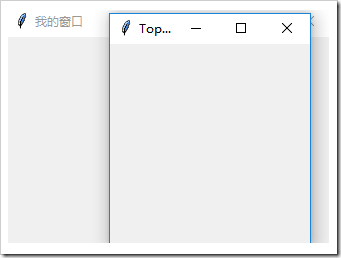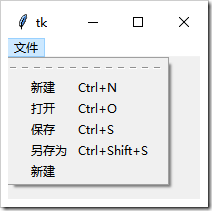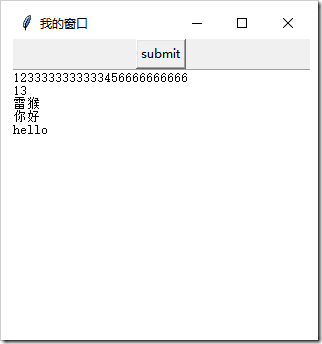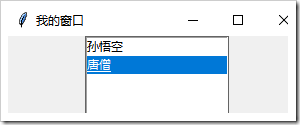相关内容:
- tkinter的使用
- 1.模块的导入
- 2.使用
- 3.控件介绍
- Tk
- Button
- Label
- Frame
- Toplevel
- Menu
- Menubutton
- Canvas
- Entry
- Message
- Text
- Listbox
- Checkbutton
- Radiobutton
- Scale
- Scrollbar
首发时间:2018-03-04 16:39
Python的GUI各有各特点。
由于只是轻微涉及GUI开发,所以就以轻量级的tkinter来学习。
tkinter的使用:
-
1.模块的导入
- [tkinter是python默认的gui库,所以一般不需要另外安装模块]:from tkinter import *
-
2.使用:
- 创建主窗口:root=Tk() 【root是一个主窗口对象】
- 创建若干个控件:控件对象=控件(root,控件参数设置) 【这里的控件也可以添加到其他窗口中】
- 将控件显示出来:控件对象.pack() 【这里也不一定是pack,也可以是其他的显示方式,比如grid,后面介绍】
- 让主窗口持续显示:root.mainloop()
-
3.控件介绍:
-
主窗口Tk[所有控件都需要附着在界面上]:
- 介绍:主窗口是所有控件附着的基础,所有控件都需要附着在界面上,如果程序中没有指定控件附着的窗口,将默认附着到主窗口Tk中,如果程序中没有定义Tk,那么将自动创建一个
- 常见属性【想要初始化主窗口的属性需要使用 主窗口对象.属性(“参数”) :
- title:窗口标题
geometry:窗口大小,大写格式是”宽度x高度+x位置+y位置”【注意不是*是x】,其中x,y将左上角作为(0,0)
from tkinter import * root=Tk() root.title('我的窗口') root.geometry('500x500') root.mainloop()
-
按钮Button:
- 介绍:按钮

- 常用参数设置【可以在创建按钮的时候指定,也可以创建后使用 按钮对象.config() 来设置】:
- text:按钮上的文本显示
- anchor:按钮上内容的位置[取值:n, ne, e, se, s, sw, w, nw, or center,其中n e s w是东南西北的缩写]
- cursor:当鼠标移动到按钮上时所显示的光标【arrow:箭头,cross:十字,dot: 点,hand1:手 …….】
- font:字体,使用元组来指定一个字体,这个元组包含了一个字体类型名字,一个以磅为单位的高度,代表一个或多个样式的字符串,比如("Times", 10, "bold")
- background[可缩写为bg]:背景色,取值可未英文颜色字符串,或者RGB值
- foreground[可缩写为fg]:前景色,取值可未英文颜色字符串,或者RGB值
- borderwidth[可缩写为bd]::边框大小
- activebackground:按钮处于活动状态时使用的背景颜色。
- activeforeground:按钮处于活动状态时使用的前景颜色。
- disabledforeground:禁用按钮时使用的颜色。
- highlightbackground:当按钮没有焦点时用于高亮边框的颜色
- relief:边框的装饰
- padx和pady:指定文本或图象与按钮边框的间距,x,y为x轴,y轴方向
- height,widht:按钮的尺寸,height为高度,width为宽度,如果不设置则默认为包括文本内容
- state:按钮的状态,可取值:NORMAL, ACTIVE 或 DISABLED。默认值为NORMAL。
- justify:对齐方式
- command:当按下按钮时调用的方法
Button所有的可设置参数
activebackground, activeforeground, anchor,
background, bitmap, borderwidth, cursor,
disabledforeground, font, foreground
highlightbackground, highlightcolor,
highlightthickness, image, justify,
padx, pady, relief, repeatdelay,
repeatinterval, takefocus, text,
textvariable, underline, wraplengthWIDGET-SPECIFIC OPTIONS【特有选项】:
command, compound, default, height,
overrelief, state, width
from tkinter import * def hello(): print("hello") root=Tk() # RELIEF=["flat", "raised", "sunken", "solid", "ridge", "groove"] btn1=Button(root,text='click me') btn1.config(bg='green',fg='white',cursor='hand1',height=10,width=10,command=hello,relief='sunken') btn1.config(anchor=LEFT) btn1.pack() # for col,i in enumerate(RELIEF): # btn=Button(root,text=i,relief=i,anchor=S) # btn.grid(row=0,column=col) root.mainloop()
-
Label:
- 介绍:显示一个文本或图象。
- 参数设置:label没有什么特别的参数,可用参数参考下面的可用参数,再可以参考Button的参数设置
STANDARD OPTIONS【label的标准可选参数】
activebackground, activeforeground, anchor,
background, bitmap, borderwidth, cursor,
disabledforeground, font, foreground,
highlightbackground, highlightcolor,
highlightthickness, image, justify,
padx, pady, relief, takefocus, text,
textvariable, underline, wraplengthWIDGET-SPECIFIC OPTIONS【特有选项】:
height, state, width
from tkinter import * root=Tk() root.title('我的窗口') root.geometry('500x500') label=Label(text='用户名:',bg='green') label.grid() root.mainloop()
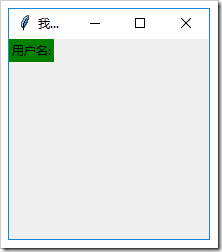
-
框架Frame:
- 介绍:一个容器窗口部件。可以有边框和背景。Frame默认是没有大小的,所以必须要设置高度和宽度,而当加了控件到Frame后它会“缩水”【这里缩水是因为Frame自动缩小到刚好能包裹控件】,需要在显示的时候强制设置大小比如pack(fill=X),这是强制填充水平方向,又或者使用 Frame对象.pack_propagate(0),这个函数可以使得设置的高度和宽度生效
- 参数设置:可用参数参考下面的可用参数,再参考按钮的参数设置
STANDARD OPTIONS【标准可用参数】
activebackground, activeforeground, anchor,
background, bitmap, borderwidth, cursor,
disabledforeground, font, foreground,
highlightbackground, highlightcolor,
highlightthickness, image, justify,
padx, pady, relief, takefocus, text,
textvariable, underline, wraplength
#这是一段没有显示Frame 代码 from tkinter import * root=Tk() root.geometry('500x500') frame=Frame(root,height = 200,width = 400,bg = 'black') Label(frame,text='mylabel').pack() frame.pack() root.mainloop()
#下面是探究出缩水原因的代码 from tkinter import * root=Tk() root.geometry('500x500') frame=Frame(root,height = 400,width = 400,bg = 'green') button1=Button(frame,text='hello') button1.pack(side=LEFT,padx=5,pady=5)#增加了边距之后,发现出了frame的背景颜色 button2=Button(frame,text='hello') button2.pack(side=LEFT) frame.pack(side=TOP) root.mainloop()
#下面的是使用.pack_propagate(0)解决了问题的代码 from tkinter import * root=Tk() root.geometry('500x500') frame=Frame(root,height = 400,width = 400,bg = 'green') # Label(frame,text='mylabel',padx=5,pady=5).pack(side=LEFT) button1=Button(frame,text='hello') button1.pack(side=LEFT,padx=5,pady=5) button2=Button(frame,text='hello') button2.pack(side=LEFT) frame.pack_propagate(0) frame.pack(side=TOP) # frame.pack(side=TOP,fill=X) root.mainloop()
-
Toplevel:
Valid resource names:background, bd, bg, borderwidth, class,
colormap, container, cursor, height, highlightbackground,
highlightcolor, highlightthickness, menu, relief, screen, takefocus,
use, visual, width
from tkinter import * root=Tk() root.title('我的窗口') root.geometry('500x500') t1=Toplevel(root) t1.title("Top窗口") t1.geometry("100x100") label=Label(t1,text="用户名:") label.pack() root.mainloop()
-
菜单Menu:
常见可用参数:activebackground, activeborderwidth,
activeforeground, background, bd, bg, borderwidth, cursor,
disabledforeground, fg, font, foreground, postcommand, relief,
selectcolor, takefocus, tearoff, tearoffcommand, title, type
from tkinter import * root=Tk() menuBar=Menu(root,tearoff=0) root.config(menu=menuBar) filemenu=Menu(menuBar,fg='green')#文件菜单下的字体是绿色的 filemenu.add_command(label='新建',accelerator = 'Ctrl+N') filemenu.add_command(label='打开',accelerator = 'Ctrl+O') filemenu.add_command(label='保存',accelerator = 'Ctrl+S') filemenu.add_command(label='另存为',accelerator ='Ctrl+Shift+S') menuBar.add_cascade(label='文件',menu=filemenu) #这里测试root.config(menu=menuBar)的作用 # def show_menuBar(): # root.config(menu=menuBar) # button=Button(text='show_menu',command=show_menuBar) # button.pack() root.mainloop()
-
Menubutton:
from tkinter import * root=Tk() menubtn=Menubutton(root,text='单击出现下拉菜单',relief='raise')#建立一个菜单按钮 menubtn.pack() #添加菜单 filemenu=Menu(menubtn) filemenu.add_command(label='新建') menubtn.config(menu=filemenu)#设置菜单按钮允许显示菜单,这里不是root了 root.mainloop()
-
Canvas:
- 介绍:组织图形。这个部件可以用来绘制图表和图,创建图形编辑器,实现定制窗口部件
- 参数设置:可用参数参考下面的,用法同样可以参考按钮Button的
- 添加图像的方法:
- create_rectangle:根据四个参数画一个矩形,四个参数是位置
- create_polygon:根据提供的多个参数画一个多边形
- 其他。。
可用参数: background, bd, bg, borderwidth, closeenough,
confine, cursor, height, highlightbackground, highlightcolor,
highlightthickness, insertbackground, insertborderwidth,
insertofftime, insertontime, insertwidth, offset, relief,
scrollregion, selectbackground, selectborderwidth, selectforeground,
state, takefocus, width, xscrollcommand, xscrollincrement,
yscrollcommand, yscrollincrement
from tkinter import * root=Tk() root.title('我的窗口') root.geometry('500x500') mycanvas=Canvas(root,width=200,height=200,bg='green') mycanvas.pack() #画一个矩形 mycanvas.create_rectangle(10,10,110,110,outline = 'red',width = 5) root.mainloop()
Valid resource names: background, bd, bg, borderwidth, cursor,
exportselection, fg, font, foreground, highlightbackground,
highlightcolor, highlightthickness, insertbackground,
insertborderwidth, insertofftime, insertontime, insertwidth,
invalidcommand, invcmd, justify, relief, selectbackground,
selectborderwidth, selectforeground, show, state, takefocus,
textvariable, validate, validatecommand, vcmd, width,
xscrollcommand.
from tkinter import * root=Tk() root.title('我的窗口') root.geometry('300x300+20+10') entry=Entry(root) entry.pack() root.mainloop()
STANDARD OPTIONS
background, borderwidth, cursor,
exportselection, font, foreground,
highlightbackground, highlightcolor,
highlightthickness, insertbackground,
insertborderwidth, insertofftime,
insertontime, insertwidth, padx, pady,
relief, selectbackground,
selectborderwidth, selectforeground,
setgrid, takefocus,
xscrollcommand, yscrollcommand,
WIDGET-SPECIFIC OPTIONS
autoseparators, height, maxundo,
spacing1, spacing2, spacing3,
state, tabs, undo, width, wrap,
from tkinter import * root=Tk() root.title('我的窗口') root.geometry('300x300+250+55') button=Button(text='submit') button.pack() t1=Text(root,height=100,width=100,cursor='cross') t1.pack() root.mainloop()
-
Message:
- 介绍:显示多行文本。类似label窗口部件,但是能够自动地调整文本到给定的宽度或比率。
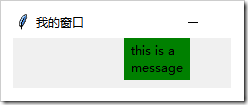
- 参数设置:与Label类似
- 由于Label也可以显示多行文本后,就逐渐少用Message了。"""Message widget to display multiline text. Obsolete since Label does it too."""
-
Listbox:
Valid resource names: background, bd, bg, borderwidth, cursor,
exportselection, fg, font, foreground, height, highlightbackground,
highlightcolor, highlightthickness, relief, selectbackground,
selectborderwidth, selectforeground, selectmode, setgrid, takefocus,
width, xscrollcommand, yscrollcommand, listvariable
from tkinter import * root=Tk() root.title('我的窗口') root.geometry('300x300+20+10') # listbox=Listbox(root) listbox=Listbox(root,selectmode=EXTENDED) listbox.insert(0,"孙悟空") listbox.insert(1,"唐僧") listbox.insert(2,"葫芦娃") listbox.pack() def func1(): print(listbox.get(0,END))#以元组形式返回所有listbox的元素 def func2(): print(listbox.select_includes(1))#当对应索引被选中时返回True def func3(): print(listbox.curselection())#以元组形式返回被选中的元素 btn1=Button(text="获取所有元素",command=func1) btn1.pack() btn2=Button(text="判断1是否选中",command=func2) btn2.pack() btn3=Button(text="获取选中的索引",command=func3) btn3.pack() root.mainloop()
-
复选框Checkbutton:
- 介绍:复选框点击这个按钮将会在这两个值间切换。
- 参数设置:可用参数参考下面的,用法同样可以参考按钮Button的
- variable:值为tkinter变量,可以使用 tkinter变量.get方法 来获取是否选中
- 如果想要获取选中值,必须设置一个tkinter变量来获取,tkinter变量类型有:BooleanVar, DoubleVar, IntVar, StringVar
可用参数:activebackground, activeforeground, anchor,
background, bd, bg, bitmap, borderwidth, command, cursor,
disabledforeground, fg, font, foreground, height,
highlightbackground, highlightcolor, highlightthickness, image,
indicatoron, justify, offvalue, onvalue, padx, pady, relief,
selectcolor, selectimage, state, takefocus, text, textvariable,
underline, variable, width, wraplength
from tkinter import * root=Tk() root.title('我的窗口') root.geometry('200x200') def submit(): print('男:',v1.get(),'女:',v2.get(),'另外:',v3.get())#选择则值为1,不选中为0 # pass v1 = IntVar() #用tkinter变量来表示按钮是否选中 v2 = IntVar() v3 = IntVar() # 使用 Checkbutton时,必须创建一个 Tkinter 变量用于存放按钮的状态: cbtn=Checkbutton(root,text='男',variable=v1,command=submit) cbtn2=Checkbutton(root,text='女',variable=v2,command=submit) #v3是为了测试variable相同时,点一个,所有的v3都被选中 cbtn3=Checkbutton(root,text='不明',variable=v3,command=submit) cbtn4=Checkbutton(root,text='保密',variable=v3,command=submit) button=Button(text='submit',command=submit) button.pack() cbtn.pack() cbtn2.pack() cbtn3.pack() cbtn4.pack() root.mainloop()
-
Radiobutton:
- 介绍:代表一个变量,它可以有多个值中的一个。点击它将为这个变量设置值,并且清除与这同一变量相关的其它radiobutton。
- 参数设置:可用参数参考下面的,用法同样可以参考按钮Button的
- variable:值为tkinter变量,可以使用 tkinter变量.get方法 来获取是否选中
- value:根据前面的variable来决定数据类型,使用 tkinter变量.get方法 此时获取的是选中选项的value的值
Valid resource names: activebackground, activeforeground, anchor,
background, bd, bg, bitmap, borderwidth, command, cursor,
disabledforeground, fg, font, foreground, height,
highlightbackground, highlightcolor, highlightthickness, image,
indicatoron, justify, padx, pady, relief, selectcolor, selectimage,
state, takefocus, text, textvariable, underline, value, variable,
width, wraplength
from tkinter import * root=Tk() v=StringVar() l=['man','woman','unknow'] def ptr(): print(v.get()) for i in l: rbtn=Radiobutton(root,text=i,variable=v,value=i,command=ptr) rbtn.pack() root.mainloop()
-
Scale:
Valid resource names:activebackground, background, bigincrement, bd,
bg, borderwidth, command, cursor, digits, fg, font, foreground, from,
highlightbackground, highlightcolor, highlightthickness, label,
length, orient, relief, repeatdelay, repeatinterval, resolution,
showvalue, sliderlength, sliderrelief, state, takefocus,
tickinterval, to, troughcolor, variable, width
from tkinter import * root=Tk() root.title('我的窗口') root.geometry('300x300+20+10') scale=Scale(root,from_=0, to=100)#默认是竖的 scale2=Scale(root,from_=0, to=100,orient=HORIZONTAL)#横的 scale.pack() scale2.pack() root.mainloop()
-
Scrollbar:
- 介绍:为配合使用canvas, entry, listbox, and text窗口部件的标准滚动条。
- 参数设置:可用参数参考下面的,用法参考按钮Button的
Valid resource names:activebackground, activerelief,
background, bd, bg, borderwidth, command, cursor,
elementborderwidth, highlightbackground,
highlightcolor, highlightthickness, jump, orient,
relief, repeatdelay, repeatinterval, takefocus,
troughcolor, width.
from tkinter import * root=Tk() root.title('我的窗口') root.geometry('300x300+250+55') button=Button(text='submit') button.pack() t1=Text(root,height=100,width=100,cursor='cross') slb=Scrollbar(root) slb.pack(side=RIGHT,fill=Y)#设置滚动条的显示形式 t1.config(yscrollcommand=slb.set)#设置允许滚动条 #由于没有绑定事件,所以直接拖拽滚动条无效 t1.pack() root.mainloop()
想要了解更多,可以参考tkinter的官方文档:http://effbot.org/tkinterbook/


